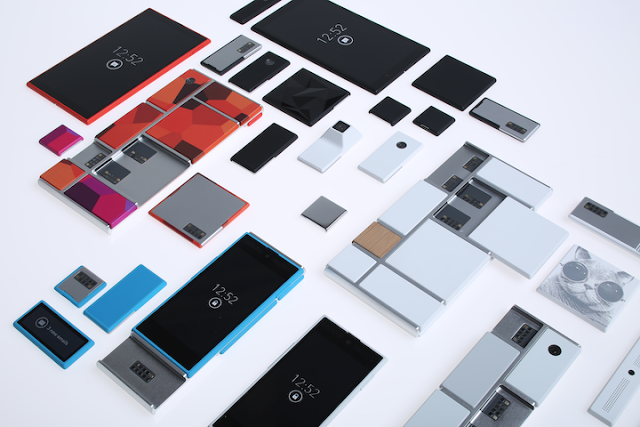Google Releases First Project Ara Module Developer Kit
Project Ara inches forward under Google's control.
When we first heard about Project Ara, it was a Motorola project, and Motorola was owned by Google. Six months later, Google has made plans to sell Motorola to Lenovo, but the search giant retained the rights to Project Ara (along with Motorola's Advanced Technology Group), so work on the modular smartphone concept continues despite the sale to Lenovo. Back in October, Motorola teased an MDK or Module Developer's Kit in 'a few months.' Now, Google is delivering v0.10.
Google's calling the first release of the Project Ara MDK 'a very early version' but says it's hoping to get feedback from the developer community to ensure the final MDK is up to par.
MORE: Lenovo Buys Motorola from Google: What Does it Mean?
That's not all, though. Google also intends to host the first Project Ara Developers Conference at the Computer History Museum in Mountain View. Developers are invited to attend in person to talk about the MDK. This event will also be live streamed for those who can't make it (though you still need to register to "attend" online). Registration closes on Friday, so if you're interested, click here. This is the first of several developer conferences for Project Ara this year.
The MDK can be downloaded at projectara.com/mdk. Head to projectara.com/ara-developers-conference for more on the conference. You can also sign up for the mailing list and join the Project Ara forum.
Follow Jane McEntegart @JaneMcEntegart. Follow us @tomshardware, on Facebook and on Google+.
Get Tom's Hardware's best news and in-depth reviews, straight to your inbox.

Jane McEntegart is a writer, editor, and marketing communications professional with 17 years of experience in the technology industry. She has written about a wide range of technology topics, including smartphones, tablets, and game consoles. Her articles have been published in Tom's Guide, Tom's Hardware, MobileSyrup, and Edge Up.
-
house70 I really hope this takes off. In a few years we'll be able to select phone components just like we can select PC components now. Awesome.Reply -
ferooxidan so how do we change the screen? all I've seen so far is module on the back. but this is seriously niceReply -
everlast66 I really like the direction this is going and their latest progress. While I liked the concept from the start, it looked much bulkier then.Reply
This really has a good chance to reduce the prices of mobile phones in a similar way modularity in PCs drove computer prices down and made them so affordable and widespread. This will allowing any manufacturer get in the market even with a module or two, manufacturers that can not compete with Apple or Samsung or we having their hands twisted by the above.
One nice "side" effect would be that you can ceep a couple of batteries and effortlessly swap the one in use if already depleted and put in a fresh one, then drop the depleted one in a charger and walk off.
Onother great thing is that you can just buy the minimum configuration first and then add or upgrade additional modules according to your needs. -
genz This is the future of phones. Modular and configurable, just like PCs. Apple, get ready to find yourself with 10% marketshare again.Reply -
03flat4 ReplyThis is the future of phones. Modular and configurable, just like PCs. Apple, get ready to find yourself with 10% marketshare again.
lol, this made me laugh. I remember those days, and I can see that coming back again if Apple does not find a way to compete with this. I hope this concept comes into fruition. Could be a nice way to change carriers too, if you could change a phone/data module.
-
everlast66 ReplyThis is the future of phones. Modular and configurable, just like PCs. Apple, get ready to find yourself with 10% marketshare again.
Its not only Apple, this time Samsung and Nokia have the most expensive SIM free smart phones, respectively S5 for £569 and Lumia 1520 for £599! Also Sony Z2 is priced as the iPhone 5S £549 which are closely followed by HTC One M8 £529. -
03flat4 ReplyThis is the future of phones. Modular and configurable, just like PCs. Apple, get ready to find yourself with 10% marketshare again.
lol, this made me laugh. I remember those days, and I can see that coming back again if Apple does not find a way to compete with this. I hope this concept comes into fruition. Could be a nice way to change carriers too, if you could change a phone/data module.
-
presna The idea is nice, but don't really see it as workable.....Reply
Look at it from the point of your notebooks, its still possible to upgrade almost every part in it, but how often do you see people going through that hassle, instead of just dumping the old one for something new..... in some cases it's not even the hassle but the cost, when you have to look into whether or not the mainboard support the new processor or the new interface and so forth..... thats the PC industry mind you....
things are moving just as fast or faster when it comes to the smartphone industry...
But on a side note, if this works, why stop at smartphones..... (even gaming consoles should be upgradeable....) -
genz Reply13088362 said:The idea is nice, but don't really see it as workable.....
Look at it from the point of your notebooks, its still possible to upgrade almost every part in it, but how often do you see people going through that hassle, instead of just dumping the old one for something new..... in some cases it's not even the hassle but the cost, when you have to look into whether or not the mainboard support the new processor or the new interface and so forth..... thats the PC industry mind you....
things are moving just as fast or faster when it comes to the smartphone industry...
But on a side note, if this works, why stop at smartphones..... (even gaming consoles should be upgradeable....)
It is NOT possible to upgrade 'nearly every part' in a notebook, and even for the parts it is possible to upgrade, it is nowhere near as easy as this is. This is Lego brick easy. The majority of Notebooks are custome shaped motherboards that are BGA socketed for example, that means the CPU is soldered to the motherboard and needs expensive equipment and awesome dexterity to remove, even then because the mother boards are one-offs for each brand, the compatible CPUs are limited to the CPUs actually in the BIOS, AND the CPUs within a few watts of the original (as the PSU is usually a one off too and only designed to the spec of the original laptop.), AND another motherboard will not fit due to the shape
As for consoles, they are not upgradable as each console specifically works very close to the metal using a lot of Low Level or native instructions on the GPU. That is how a weak GPU can often rival a PC. Changing that GPU to another architecture would crash most games, and require the rendering APIs to be completely rewritten as well as portions of each game, whist simultaneously ruining the economies of scale that allow consoles to undercut PCs by such a stretch and requiring alternate, higher power PSU's to be developed above the 100w spec that consoles have adhered to for a LONG time.

